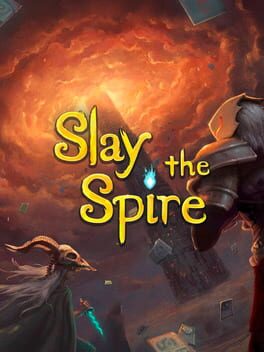It's telling that most people describe this as a roguelike first and a deck-builder second. "Roguelike", as a concept, has a tendency to dominate whatever core gameplay loop it provides for - and this is no exception. I really liked working out my deck and watching it play out in practice, but the game's insistence on taking my cards away from me every time I made a single serious mistake was, in short, a real fucking pain in the arse.
Really proud of a deck that allows you to summon ten zero-cost swords that stack multiplied damage on top of each other? Too bad, because you came up against the hard counter to that deck and now you are back at square one and must spend twenty minutes gambling your way back to whatever new build the algorithm's dice deem probable for you. Frustrating, time-consuming, and ultimately mindless in a way that invites "one more go" addiction rather than thoughtful pondering of cards. It's a wonder that no one has harnessed roguelikes and real-money gambling yet...
Wouldn't it be more fun to experience the failure of a hard deck-counter and then spend time reconstructing your cards in a way that allows you to overcome that specific scenario, rather than forgetting about the loss and moving on to something else entirely? That's the fundamental fatal flaw with roguelikes, I think - you rarely have to reflect on losses or challenges because your next run is going to go a totally different way. You're passing time until you get the right sword with the right boon against the right enemy.
I beat this after a dozen or so tries - not because I gained mastery of its systems, but simply because I eventually rolled a deterministic environment where I had good cards and the enemy did not have the right skills to counter those cards. No reflection or growth necessary! I would love a version of Slay the Spire that actually disciplined players into learning its intricacies - even a simple stone-set RPG of intentional design would probably trump the computed 52-card pickup that the game offers at the moment. Despite my natural inclination against the nature of traditional RPGs, I still want an overworld and towns and dungeons that I can use to explore Spire's cards and their interplay... They are so well-crafted, but the game offers surprisingly few incentives or avenues for exploring their depth. Let's break free from the roguelike legacy!!
Really proud of a deck that allows you to summon ten zero-cost swords that stack multiplied damage on top of each other? Too bad, because you came up against the hard counter to that deck and now you are back at square one and must spend twenty minutes gambling your way back to whatever new build the algorithm's dice deem probable for you. Frustrating, time-consuming, and ultimately mindless in a way that invites "one more go" addiction rather than thoughtful pondering of cards. It's a wonder that no one has harnessed roguelikes and real-money gambling yet...
Wouldn't it be more fun to experience the failure of a hard deck-counter and then spend time reconstructing your cards in a way that allows you to overcome that specific scenario, rather than forgetting about the loss and moving on to something else entirely? That's the fundamental fatal flaw with roguelikes, I think - you rarely have to reflect on losses or challenges because your next run is going to go a totally different way. You're passing time until you get the right sword with the right boon against the right enemy.
I beat this after a dozen or so tries - not because I gained mastery of its systems, but simply because I eventually rolled a deterministic environment where I had good cards and the enemy did not have the right skills to counter those cards. No reflection or growth necessary! I would love a version of Slay the Spire that actually disciplined players into learning its intricacies - even a simple stone-set RPG of intentional design would probably trump the computed 52-card pickup that the game offers at the moment. Despite my natural inclination against the nature of traditional RPGs, I still want an overworld and towns and dungeons that I can use to explore Spire's cards and their interplay... They are so well-crafted, but the game offers surprisingly few incentives or avenues for exploring their depth. Let's break free from the roguelike legacy!!
2 Comments
Most of the hard counters in Slay the Spire are rather soft overall and can be beaten fairly well, like timing when to use your 0 costs vs. the Time Eater if you have a spammy deck. It's not an especially luck-based roguelike.
I would agree with the previous comment that it is not as much of a luck based game as you're describing. Yes, sometimes the game wants you to win and sometimes it wants you to lose, but a great player can still win a bad seed and a bad player can lose an easy seed. But that being said, every card game is existence has RNG and this is no different. I just don't think it's as bad.
This comment was deleted

gamefucker6969
2 years ago